- Home
- Frank Herbert
Frank Herbert Page 15
Frank Herbert Read online
Page 15
“What you want?” Karl’s eyes were on the hand in Rollo’s pocket.
Rollo swallowed, dredged up a thin flag of courage that was held aloft by greed—a need to get something out of the ordeal they had already survived. But might not survive unless Rollo could maneuver through these dangerous waters. He moved his hand in the pocket, made sure the .38 was prominent.
“I want part of the money. Just my share,” he said, as if he needed to explain it.
Karl scowled. “And who decides your share?” As if the fat boy deserved half of what remained.
Rollo looked at the satchel, could not know how much they had actually stuffed in there during the frantic minutes of the robbery. “A thousand,” he said. A nice round number.
Anger flashed across Karl’s face, but the baying hounds made him change his mind. With a look of disgust, he opened the leather satchel. “A thousand?” He began hefting out stacks of bills, ten banded bundles like valuable decks of cards. “There, a thousand.”
Clearly not half of what the satchel contained, but that was the number Rollo had demanded. Karl snapped the satchel shut.
Rollo picked up the bills and held the jumble in his hands. Since they had to run, this was going to be a problem. “How am I supposed to carry this?”
“That’s not my problem,” Karl said, then glanced at the body of Skeeter Ricco in his bright but now bloodstained coat. “Use the yellow coat. Skeeter doesn’t need it anymore.”
Rollo felt sick. He held the bills in his hands, stared at the body, and Karl trudged off as the barking dogs came closer. Rollo didn’t want to leave the money behind. Finally, after too long a hesitation, he set the bills on the moist forest floor, knelt, and tugged the coat from the dead man’s limp torso, working the uncooperative arms out of the sleeves.
Karl was already hurrying down the path. Ricco tumbled the bills into the coat, then folded the waterproof fabric over them, folded again, and finally had a neat package that was possibly worth dying for. He grabbed it up and ran after his companion.
Karl was already almost to the creek, brooding. The thousand doesn’t matter, he thought. Let the little jerk have it. They’ll find Ricco’s body, and since he waited outside of town with the car, they’ve seen only two of us. Now they’ll think there’s only one left—a short, fat boy. At the creek I think we’ll split. It’ll be too bad if they find Rollo—too bad for Rollo.
Behind, Rollo’s fear had returned. What will Karl do now? He doesn’t need me. But the little man’s fear of those who followed was greater than his fear of Karl; so he stayed close, even knowing how murderous the man was.
Abruptly, Rollo heard Karl’s feet clatter on a log plank bridge, and from his childhood he remembered this place.
“That’s Watson’s Hole crossing,” he called, and hurried to catch up.
“Shut up and listen!” Karl whispered.
Above on the ridge, they heard the dogs, their barking now a frenzy of yapping and howling.
“They found ’im,” Karl said. “That’ll bring the men up on the run.” Then, “Here’s where we split up, Rollo boy. We’re going to confuse ’em. You head upstream and I’ll go down. When we’re clear, we’ll meet at the Lockton Hotel in Savannah. First one there registers under the name of Skeets. Got that?”
Fear had muted Rollo’s tongue. “Go it alone?” He gulped.
Karl hurried on. “Don’t take chances, but if you’re caught, clam up. Now good luck.”
Rollo heard a soft splash in the creek below the bridge. For a moment he waited, almost willing to brave Karl’s wrath and follow. But he thought better of it. He had a thousand dollars, and Karl was short tempered. It didn’t occur to him that he could have shot Karl in the back coming down the ridge and then taken all the money. One didn’t think things like that about Karl Daggert.
He turned and lowered himself clumsily over the opposite side. The water was marrow chilling, creeping up his pants legs. His teeth began to chatter. Slipping and clutching at limbs, he made his way upstream.
Downstream, Karl waited until Rollo’s progress could no longer be heard, then he began to follow, leaving subtle spoor along the banks—a hand print in the mud, a broken limb. He did this for perhaps a hundred yards, then turned and made his way back and under the bridge….
On the upstream side, Rollo hadn’t gone more than a quarter of a mile before he stumbled into a deep hole hollowed out by a low waterfall. He almost lost the yellow coat with its wrapper of bills and, when he had rescued it dripping from the creek, he turned and faced the falls. It was so dark he couldn’t see the water, but from the sound, he judged that it couldn’t be dropping more than three feet.
Suddenly, an inspiration hit the little man. This was limestone country, and sometimes behind a waterfall was a hollowed-out place deep enough for a man to hide. There wasn’t room to stand behind this fall, but if he sat in the water, there might be breathing space.
Above the noise of the water, Rollo heard the sudden confused yapping of the dogs at the bridge. It spurred him into action. He waded into the hole and ducked under the falling water. Clutching the waterlogged coat, he scrambled ahead and lifted his face from the stream. He emerged into damp air, abysmally dark. Falling water seemed to echo from the darkness ahead. A steady trickle ran down his neck and under his clothes.
Rollo sent an exploratory hand ahead and found no back wall. Feeling his way, he inched forward on his hands and knees. The cave floor went up slightly and then down. A shallow stream ran under him, its bed hard against his palms. Cautiously, he crawled farther and farther into the blackness. Maybe there’d be a dry spot ahead. And the farther he went into the hole, the safer he felt. There was a protective, secret air about the place that he seemed to remember from childhood caves.
Abruptly, he came to a turn, felt his way around it, and his exploring hand reached into nothingness beneath him. He could hear a stream gurgling over rocks ahead and below. The sound of the falls behind him was muted now. Slowly, in the cramped space, Rollo turned around and eased backwards down the wet incline.
Without warning, his feet slipped on the slimy rocks. He fell, clutching, sliding, and scrambling, down a slick wall, to be brought up with a splash standing at the bottom in about two inches of water. He held the yellow coat against his chest as though it offered protection. Around him, he could hear the deep rolling swish of much water passing over a smooth bed.
As his first fear receded, stories from his childhood came crowding back into Rollo’s mind—about dogs that ran into dark holes and were never seen again, the legend of an underground river running through the limestone and boiling to the surface near Boomer Island on Bell Lake. That had to be the answer.
All of this came back to him in the blackness, and then his position underground enveloped him. Fear returned with a sickening ball in his stomach, tightening his chest.
What if he should become lost down here—as had the dogs?
With one hand, he reached up and tried to climb back the way he had come. The slimy limestone gave no footing. Turning to his left, he moved ahead cautiously. Maybe there was another way out. His feet encountered a ledge. He leaned over and felt it with his hand. It went up about two feet. He stepped out of the water, lifting his head slowly for fear of hitting the ceiling.
Hesitantly, Rollo felt his way forward and encountered a smooth, slippery wall. He turned and leaned against it. Trapped! He tried to fight down the panic, but it overwhelmed him, and he slid to the ledge.
For a long time he sat shivering, tears running down his cheeks.
Finally, he gained new strength and began a frantic mental groping. His mind came to focus on one item: cigarette lighter. He reached under his coat and felt in a vest pocket. The lighter was still there. He brought it out, flipped open the lid, and spun the wheel. A tiny light flickered upward. It threw dancing shadows on the green-and-black walls.
Looking up and to his left, Rollo could make out the small underground waterfall down wh
ich he had fallen. Above it, the ceiling was rainbowed with icicle-like stalactites. The falls cataracted over a sheer face for more than fifteen feet. He could never make it back.
To his right, the ledge on which he sat extended in an undulating stalagmited path along the river, disappearing in the darkness. The oily black waters ahead of him gave off a faint, rippled gleam of light.
Rollo stood up and, looking downstream, came to a decision. Karl was down there on the surface somewhere. Maybe there was another exit. He snapped off the light and replaced it in his vest pocket.
With one hand on the wall, the other clutching the yellow coat, he made his way down the ledge for as far as he had been able to see it. Stopping where he guessed that spot to be, he brought out the lighter and peered ahead.
In this manner he made his way down the underground river. Sometimes he was forced to wade, and once he had to cross the stream to a ledge on the opposite side. Fear gripped him all the way, lest he lose his footing and be swept away into the oily darkness. Whenever he flicked on the lighter, he searched the ceiling for an opening. Several times he paused to explore small streams coming down the walls, always to no avail.
The farther down the river he went, the greater his fear became. Fear made his steps cautious, and this was what saved him when he came to the end of the ledge.
It was just a small sound, much like the noise an oar makes when dipped into the water. Stopping, Rollo took out the lighter. Its flame, smaller now, showed him the end of the ledge and a deep boiling hole where his next step would have been. In fright, he stepped back. Ahead, he saw what was making the noise. The river made a sudden descent, waves washing against a black wall. Under the wall, the water disappeared.
Flicking off the lighter, Rollo sat down. So this was the end. He placed the yellow coat beside him. Thought of the coat made him realize it was very cold in the cavern. His teeth began to chatter.
Almost idly, Rollo wondered if he’d have enough courage to take the easy way out—suicide. He reached into his pocket and pulled out the automatic Karl had given him for this job. He pointed the gun across the cavern and pulled the trigger. There was a dull click. Working the action, he pulled the trigger again. It was the same. And again. And again until the gun was empty. The ammunition was wet. He threw the gun into the blackness and heard it splash.
He took out the lighter and pressed the wheel. The flame flickered up. By its light Rollo watched the long wavering line where the river rolled under the wall. In a short while the flame died down farther and farther, ending in a tiny smoldering spark on the wick. Rollo threw the lighter after the gun. It made a smaller splash.
The sound of the lighter hitting the water and the mental picture of the dull metal object being swept in a slanting course to the bottom of the river brought a new thought to Rollo’s mind.
What if the river actually did come out in the lake? Then if a man went in here he could come out on the surface. It was a long chance, but there was nothing but death in the cavern—slow death at that. The other way would be faster and with the added spice of a chance—just a chance.
With that thought, Rollo stood up and began taking off his clothes. He folded them neatly and placed them one by one on the yellow coat with its bundles of money. Later, armed with a ladder and a flashlight, he could return for the money.
Lastly, he placed his shoes on the pile and stood up in his thin underwear. At this point he almost lost his nerve. Maybe there was another way. But he knew there wasn’t.
In a momentary surge of courage, he felt with his toes for the rim of the ledge and fell rather than dove off. The icy current gripped him immediately and sucked him downward. He felt a slimy wall brush his right hand, and then he was up in blackness with his head out of water. He imagined the cavern’s rough ceiling above him and gulped another lungful of air before the current sucked him under for a second time.
This time the waters took him downward—down, down, and down. He felt the pressure growing almost unbearable on his ears, and then it turned and swooped upward at an incredible speed. Once, his shoulder hit a wall, sending blinding pain through his body. Feebly, he tried to help. He moved his hands aimlessly upward. Breath! He had to have breath! Then he was on the surface, more dead than alive.
Listlessly, he paddled with his right hand while gasping for breaths that were half water. Somewhere in his mind, he realized that his left shoulder was broken. But it seemed to make no difference.
The magnitude of what he had done was enough to wipe out all the shame of all the cowardice of his past. Even if he were to die now. He felt exhilaration deep within him. He had done a brave thing—in desperation, yes, but on his own initiative.
With his good hand, he turned himself over and began to float. A current was taking him somewhere, and the waters had lost their first chill. He looked up and saw the moon low on the hills, highlighting a long line of thunderheads in silver.
Cloudbursters, they’d called that kind of thunderhead when he was a boy.
His bad shoulder grated on rocks, sending a flash of pain radiating through his body. Rollo realized that he had drifted onto a beach. Turning over to protect his shoulder, he found bottom with his knees and half scrambled, half climbed out. There was a darker mass of bushes ahead. The beach shone in the moonlight. He turned to the right and limped along the rocks.
It was hardly fifty feet from the spot where he emerged to the place where he caught the almost invisible gleam of firelight back in the trees.
O O O
Indian Karl Daggert had made short work of his trip to the lake. Holding to the deepest spots in the creek, he had scrambled downward, always careful not to touch anything that would hold scent.
At the lake he’d stripped off his clothes and tied them and the satchel with the remaining money into a neat bundle, using his belt as a rope. This bundle he’d rested on a log, which he’d pushed ahead of him across the lake to Boomer Island. It hadn’t taken long to find that he was alone there. On a low spot in the center he’d built a small fire and dried his clothes.
For a while he’d watched the lightning in the hills, thinking of Rollo up there. Several times he’d smiled at the thought of how easy it had been.
Karl was squatting beside the fire, thinking of how good it would be to have some food, when Rollo stepped out of the bushes across from him. For a moment the tall man’s mind refused to register on what his eyes saw. Rollo—it couldn’t be!
Then the pudgy man was beside him, sobbing in relief and babbling something about a cavern and a river.
For a moment, blind, killing rage seethed in Karl’s mind. The fool! He became frightened! So he followed me!
Then reason replaced the hate. So he followed me. Well, there’s nothing for it now but to think of some way to use him.
Aloud, he said, “Sit down by the fire.” For the first time, he noticed Rollo’s shoulder. “What’s wrong with your shoulder?”
“Broken,” Rollo said.
There was momentary surprise in Karl’s mind at the lack of servility in the fat man’s voice, but he passed over it. “Sit down. There’s nothing we can do for it now.”
Obediently, Rollo sat. The fire was warm on his face, but the chill air was cutting against his wet back. He thought of asking Karl for a coat but stifled the words. Somehow, the old begging and whining didn’t seem right now.
The sky began to grow light around them. Rollo could make out the shapes of trees beyond the firelight. A bird called in a thicket at the opposite end of the island. It was answered from somewhere behind him. He heard something wrong with the bird calls, but his weary mind refused to register what exactly was different.
In spite of the pain in his shoulder, in spite of the cold, Rollo leaned back, found soft moss beneath him, and went to sleep.
From the other side of the fire, Karl watched his companion. His mind picked up first one idea and then another, only to reject all. The little fool! Everything was perfect!
So
intent was he on his thoughts that he failed to hear the soft rustle of bushes behind him until a voice barked, “Reach!”
Involuntarily, he started to raise his hands, then caught himself and dived across the fire toward the bushes. From his left, a rifle spoke once, dropping him into the flame.
Tall men stepped out of the trees and pulled Karl’s body from the fire, smothering the flames.
Rollo was leaning up on his good arm, trying to shake the sleep from his eyes, unable to understand what was happening. One of the tall men was standing over him, a rifle pointing at his chest.
“Okay, bud,” the man said. “How do you figure in this?”
Rollo looked across the fire at Karl’s body—Karl, dead?—and instinctively he knew the form this story should have—just as he’d always known how his stories should go.
“He held me hostage as a guide,” he said.
“Yeah?” The man’s gun was unwavering. “Who’re you that you know so much about this country?”
“My name’s Rollo Eckstrom. Why, man, I was born not more than two miles from here. This fellow and another guy got acquainted with me in a Louisville bar. They asked all kinds of questions about where I was from and was there many banks around. Said they was investment counsels or something like that. We went outside to go to another place and got in their car. First thing I know, the other guy has a gun on me—and here I am.”
Rollo paused for breath. The gun hadn’t moved.
“They fought over the money last night,” he went on. “This one killed the other. He was going to kill me, too. He broke my shoulder so I couldn’t swim and took my clothes. My name’s Rollo Eckstrom, man! I’m no bank robber.”
The gun was pointing away now. “Where’d they leave you when they robbed the bank?”
“They left me tied in a car just outside of town. My name’s …”
“Yeah, you’re Rollo Eckstrom all right. I’m Pete Jenkins—Sheriff Pete Jenkins. We went to school together, Rollo. Remember?”
Rollo looked into the other’s face. Through the adult flesh, he recognized the youthful features of a childhood friend, one of the few people he’d ever known who hadn’t called him “Rollo” in a patronizing way. “Pete Jenkins,” he said.

 Direct Descent
Direct Descent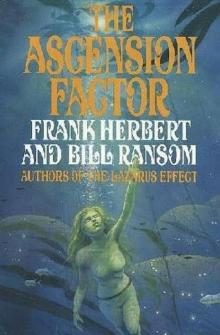 The Ascension Factor
The Ascension Factor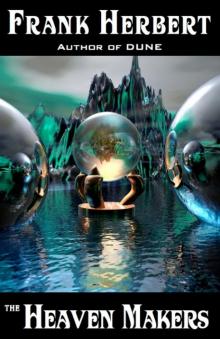 The Heaven Makers
The Heaven Makers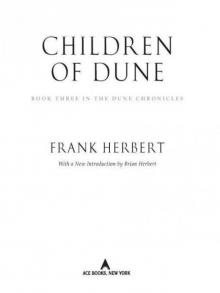 Children of Dune
Children of Dune Old Rambling House
Old Rambling House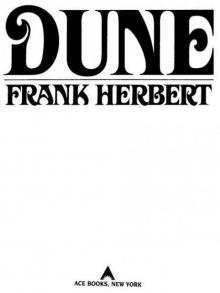 Dune
Dune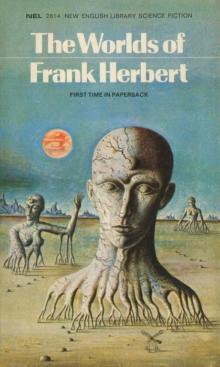 The Worlds of Frank Herbert
The Worlds of Frank Herbert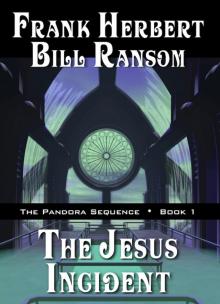 The Jesus Incident
The Jesus Incident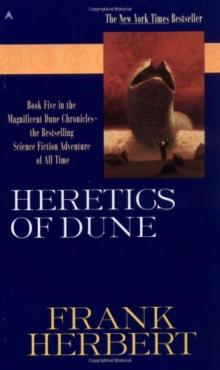 Heretics of Dune
Heretics of Dune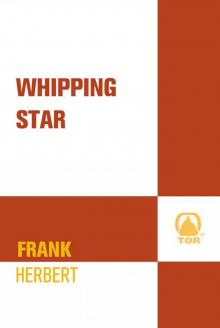 Whipping Star
Whipping Star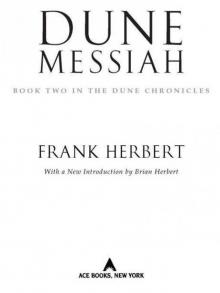 Dune Messiah
Dune Messiah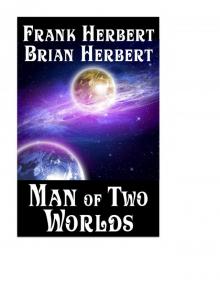 Man of Two Worlds
Man of Two Worlds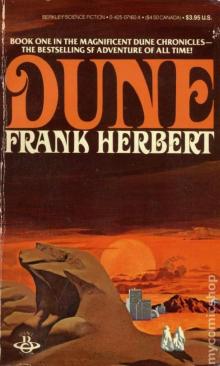 The Book of Frank Herbert
The Book of Frank Herbert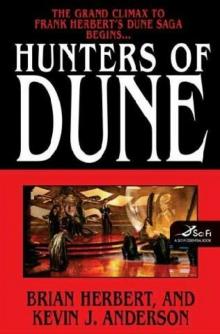 Hunters Of Dune
Hunters Of Dune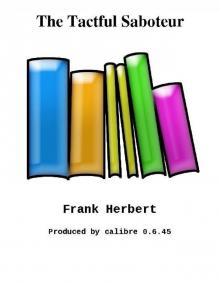 The Tactful Saboteur
The Tactful Saboteur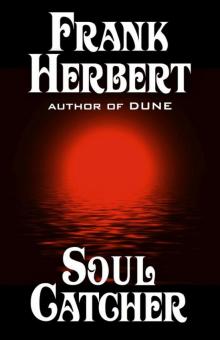 Soul Catcher
Soul Catcher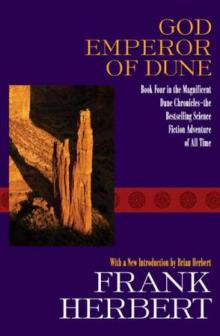 God Emperor of Dune
God Emperor of Dune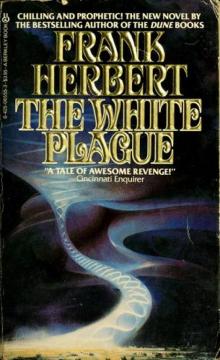 The White Plague
The White Plague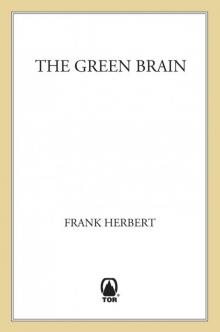 The Green Brain
The Green Brain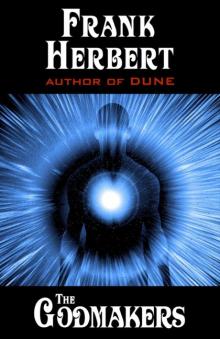 The Godmakers
The Godmakers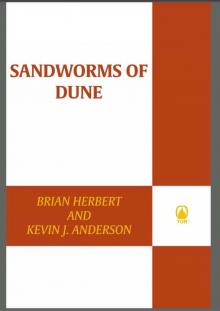 Sandworms of Dune
Sandworms of Dune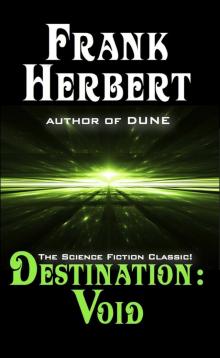 Destination Void
Destination Void The Dosadi Experiment
The Dosadi Experiment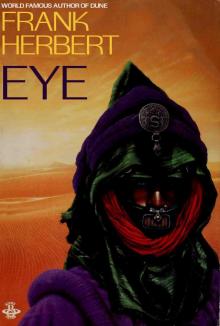 Eye
Eye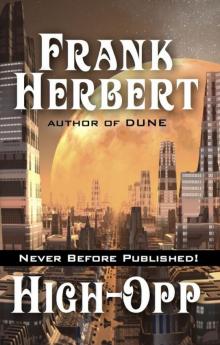 High-Opp
High-Opp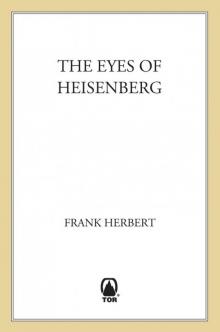 The Eyes of Heisenberg
The Eyes of Heisenberg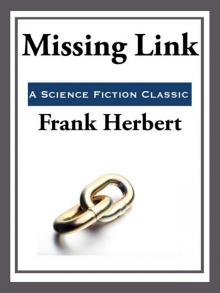 Missing Link
Missing Link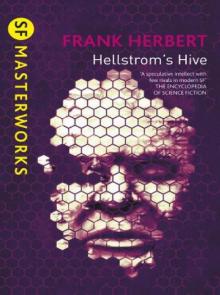 Hellstrom's Hive
Hellstrom's Hive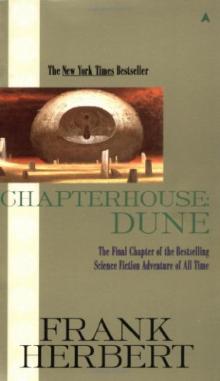 Chapterhouse: Dune
Chapterhouse: Dune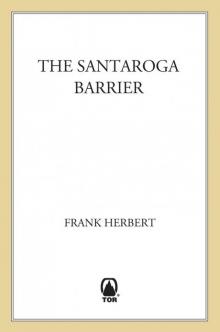 The Santaroga Barrier
The Santaroga Barrier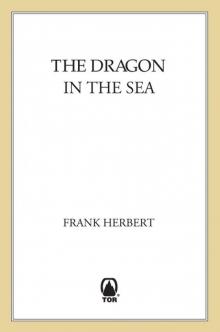 The Dragon in the Sea
The Dragon in the Sea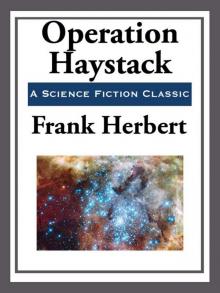 Operation Haystack
Operation Haystack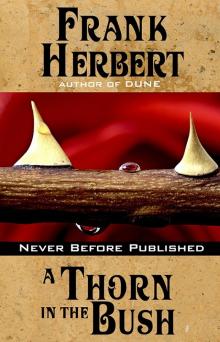 A Thorn in the Bush
A Thorn in the Bush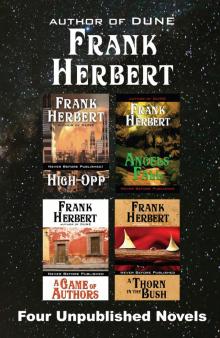 Four Unpublished Novels
Four Unpublished Novels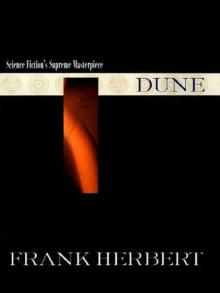 Dune dc-1
Dune dc-1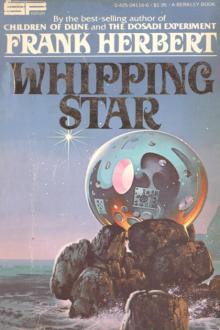 Jorj X. McKie 1 - Whipping Star
Jorj X. McKie 1 - Whipping Star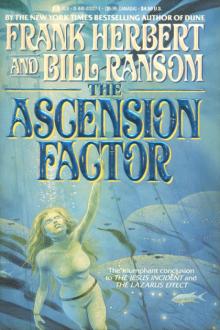 DV 4 - The Ascension Factor
DV 4 - The Ascension Factor Frank Herbert - Dune Book 4 - God Emperor Of Dune
Frank Herbert - Dune Book 4 - God Emperor Of Dune ChapterHouse: Dune dc-6
ChapterHouse: Dune dc-6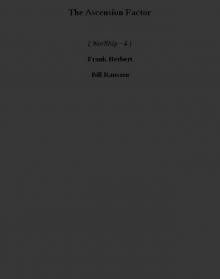 The Ascension Factor w-4
The Ascension Factor w-4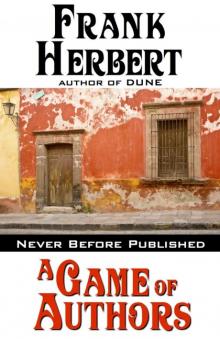 A Game of Authors
A Game of Authors Children of Dune dc-3
Children of Dune dc-3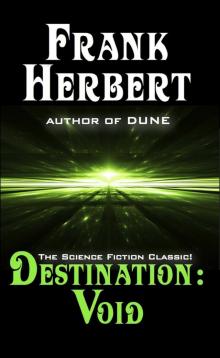 Destination: Void: Prequel to the Pandora Sequence
Destination: Void: Prequel to the Pandora Sequence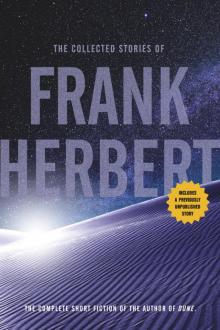 The Collected Stories of Frank Herbert
The Collected Stories of Frank Herbert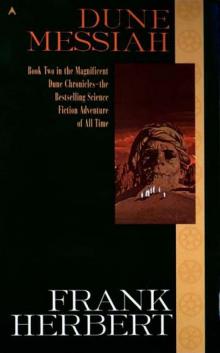 Dune Messiah dc-2
Dune Messiah dc-2 Frank Herbert - Dune Book 5 - Heretics of Dune
Frank Herbert - Dune Book 5 - Heretics of Dune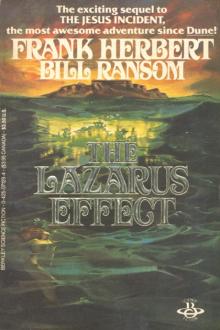 DV 3 - The Lazarus Effect
DV 3 - The Lazarus Effect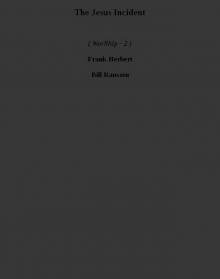 The Jesus Incident w-2
The Jesus Incident w-2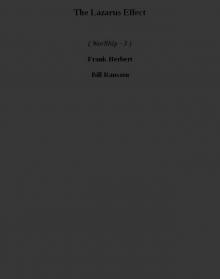 The Lazarus Effect w-3
The Lazarus Effect w-3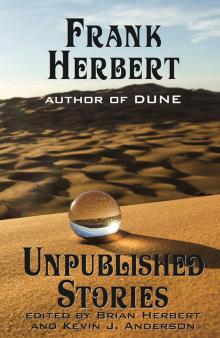 Frank Herbert
Frank Herbert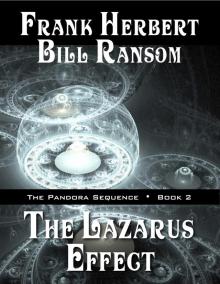 The Ascension Factor: Pandora Sequence
The Ascension Factor: Pandora Sequence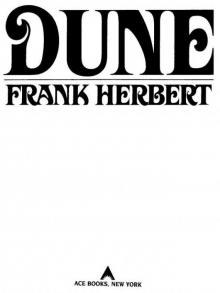 Dune (40th Anniversary Edition)
Dune (40th Anniversary Edition)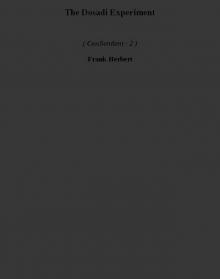 The Dosadi Experiment c-2
The Dosadi Experiment c-2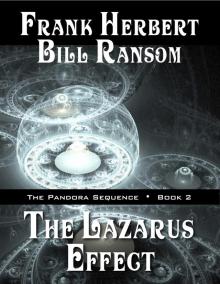 The Lazarus Effect
The Lazarus Effect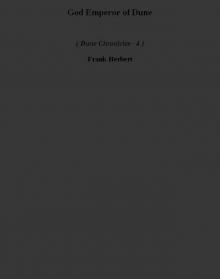 God Emperor of Dune dc-4
God Emperor of Dune dc-4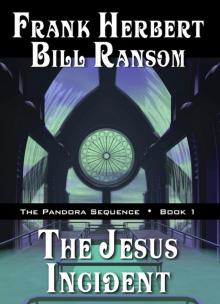 The Pandora Sequence: The Jesus Incident, the Lazarus Effect, the Ascension Factor
The Pandora Sequence: The Jesus Incident, the Lazarus Effect, the Ascension Factor The Green Brain (v4.0)
The Green Brain (v4.0) The Heaven Makers (v4.0)
The Heaven Makers (v4.0) Heretics of Dune dc-5
Heretics of Dune dc-5